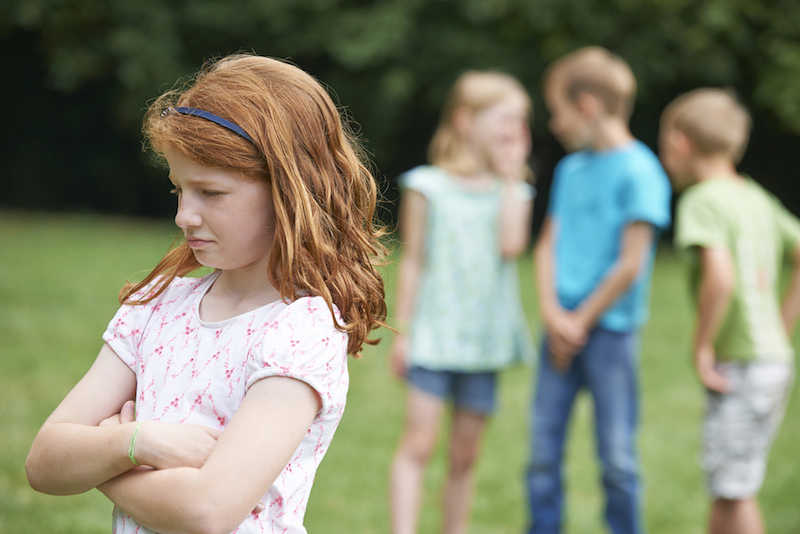5 Ways to Talk to Your Kids About Bullying
How to help

High school bullying, whether it's an online spat or ostracism in the lunchroom, is fairly common. But despite its prevalence, bullying can be a difficult topic to discuss.
That's because kids usually don't tell adults that they're being bullied, said Robert Faris, an associate professor of sociology at the University of California, Davis.
"Kids just don't talk to adults about bullying, by and large," Faris told Live Science. "That includes their own parents, counselors, teachers and coaches. And so parents kind of have to become detectives." [Understanding the 10 Most Destructive Human Behaviors]
But all detectives need leads. Here are five ways parents can detect and discuss bullying with their children, including ways to figure out whether their child is the perpetrator or the target.
Look for signs

At any given time, approximately 30 percent of high school students are engaged in aggressive, bullying behavior, and another 30 percent (with some overlap between the two) are targeted by bullies, Faris told Live Science.
"The gist of bullying is that it's intentional harm doing, intentional cruelty against people who have a difficult time defending themselves," Faris said.
This malice can take a toll. Most children who are bullied show signs of withdrawal, bursts of emotion and changes in friendship, he said. They may also start skipping class or extracurricular activities, he added.
However, these are also signs that any typical, moody teenager might show. So if a parent notices these changes, it's important that they ask their child what's going on, Faris said.
Don't call it "bullying"

Parents shouldn't ask their child outright about bullying.
"It would be a mistake to dive right in and ask about being bullied," Faris said. "In fact, I wouldn't even use that term, because kids don't use that term. They're more likely to describe it as 'drama' or 'beef' or 'talking s---.'"
Even if the child is being bullied, acknowledging it using the word "bully" implies a powerlessness that he or she may not want to acknowledge, Faris said. Other words don't necessarily have that connotation, he said.
Instead, parents can ask their children indirect questions that may help them open up. For instance, "ask what's going on with the friend who's all of a sudden MIA," Faris said. Or, ask them why they're skipping an activity that they once enjoyed.
Alternatively, parents can ask their child's friends what's going on. If the friend feels comfortable, he or she can anonymously, or even in confidence, explain what is happening.
Build coping skills

Coping skills can help children deal with bullying situations. For instance, have your child make an appointment with a school counselor, who can keep a record of the bullying incident(s) and also help the child assess the situation and think of ways to deal with it, Faris said.
It helps if the child is involved in extracurricular activities and has friends outside school. "If things turn sour at school, kids can feel like the whole school is against them," Faris said. "If they have an outside school activity or friend, they can shift their energy into that." [10 Scientific Tips for Raising Happy Kids]
It's also important to remind the child that life exists after middle school and high school. Sometimes kids can be myopic, Faris said, and reminding them that life is a long journey will help them take a long-term view, he said.
If the bullying does not stop, and the school is not being supportive, it might be best to change schools, Faris said.
Understand why bullying happens

Some bullies are really social-ladder climbers in disguise. "They're often not picking on kids who are vulnerable or mentally disabled," Faris said. "They're picking on kids who are their rivals. It's not due to empathy deficits so much as the competition for status."
Much of Faris' academic work is a response to the idea that bullies are driven by psychological deficiencies, such as low empathy or high emotional reactivity (an intense reaction to a stimulus).
"Those are reasons, but they're not the only ones," Faris said. "What I found is, as kids increase their social status, their bullying behavior tends to increase as well, until they approach the very top."
Faris and his colleagues surveyed students at 19 schools, asking students about the kids they bullied and who bullied them. Then, the researchers assessed who was popular by looking at yearbooks, which includes homecoming royalty and who gets voted "the best" by their classmates, in categories such as best eyes or best hair. The most popular kids were at the 100th percentile, he said.
Aggressive, bullying behaviors in social climbers tended to peak when kids were at the 94th percentile in popularity, and then those behaviors plummeted, the researchers found. The most popular kids, who were often at the center of the school's social networks, were the least likely to engage in bullying, Faris said.
"Once they're at the top, they don't need those behaviors," he said. "They have the luxury to be kind, which solidifies the position." Moreover, these kids didn't necessarily have to get to the top by bullying. Sometimes, they were popular athletes or known for being kind and outgoing.
The research showed that bullying works, at least for social climbers, Faris said. Those who bullied their popular peers often wound up in elite social circles, he said. This explains why some bullies and targets have mercurial friendships — they're often targeting each other to climb the social ladder, he said. [How to Talk to Kids About Bullying and Abuse]
What if your child is the bully?

If a child is a bully, it's best to figure out what's driving that behavior, Faris said. For instance, a different approach will be needed depending on whether the child is bullying kids at the bottom of the pecking order or whether the child is targeting peers to climb the social ladder.
After talking with their children about the problem, parents can help by setting a good example, Faris said. For instance, "Are you gossiping about other parents in front of your kids? Do you covet your neighbor's new Honda Odyssey? Do you try to one-up your friends with your clothes, your plastic surgery or your career?" Faris asked.
If you are, try to re-evaluate your attitudes and behavior, and encourage your child to do the same, he said.
Sign up for the Live Science daily newsletter now
Get the world’s most fascinating discoveries delivered straight to your inbox.

Laura is the archaeology and Life's Little Mysteries editor at Live Science. She also reports on general science, including paleontology. Her work has appeared in The New York Times, Scholastic, Popular Science and Spectrum, a site on autism research. She has won multiple awards from the Society of Professional Journalists and the Washington Newspaper Publishers Association for her reporting at a weekly newspaper near Seattle. Laura holds a bachelor's degree in English literature and psychology from Washington University in St. Louis and a master's degree in science writing from NYU.










